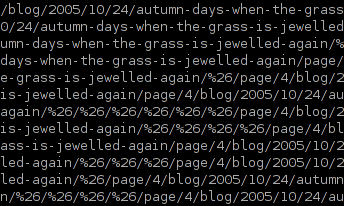Curious problem
In which we have an obscure font problem, in annoyingly specific circumstances
Only a day after the new garden blog went live, I found myself with a problem. This morning, I noticed a problem with it, on K’s PC. Moreover, it was only a problem on K’s PC. On her PC, in Firefox and in IE, the heading font was hugely oversized compared to the rest of the page. In Chrome, everything was fine.
Now, I’d tested the site in all of my browsers. On my Windows PC, running Window 7 just like K’s, there were no problems in any of the browsers I’d tried. On my Linux box, all fine; on my FreeBSD box, all fine. But on K’s PC, apart from in Chrome, the heading font was completely out. Whether I tried setting an absolute size or a relative size, the heading font was completely out.
All of the fonts on the new site are loaded through the Google Webfonts API, because it’s nice and simple and practically no different to self-hosting your fonts. Fiddling around with it, I noticed something strange: it wasn’t just a problem specific to K’s PC, it was a problem specific to this specific font. Changing the font to anything else: no problems at all. With the font I originally chose: completely the wrong size on the one PC. Bizarre.
After spending a few hours getting more and more puzzled and frustrated, I decided that, to be frank, I wasn’t that attached to the specific font. So, from day 2, the garden blog is using a different font on its masthead. The old one – for reference, “Love Ya Like A Sister” by Kimberly Geswein – was abandoned, rather than wrestle with getting it to render at the right size on every computer out there. The replacement – “Cabin Sketch” by Pablo Impallari – does that reliably, as far as I’ve noticed;* and although it’s different it fits in just as well.
* this is where someone writes in and says it looks wrong on their Acorn Archimedes, or something along those lines.

 Home
Home

